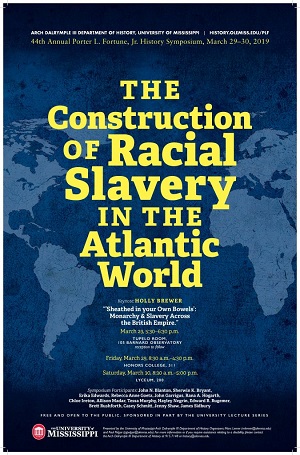
2019: The Construction of Racial Slavery in the Atlantic World
The Wife, the Whore, and the Wench: Colonial Women and the Development of Racial Hierarchy in 17th Century Barbados
Document Type
Event
Location
Honors College 311
Start Date
29-3-2019 1:45 PM
End Date
29-3-2019 2:30 PM
Description
This essay examines the experiences of three unnamed women, a merchant’s wife, an Irish servant, and an enslaved African, whose lives and labors entwined in a Bridgetown, Barbados household in the 1670s. The women emerge as mere traces in the written archive, the anonymous subjects of a handful of letters between a group of elite Irish brothers from Galway, some of whom had ventured into England’s Caribbean empire. Referred to only as “wife,” “whore” and “wench,” all three women survived the tumultuous events of 1675 in the colony (a slave uprising and a devastating hurricane) even as they were embroiled in a more insidious, and ultimately more significant, transformation: the circumscribing of white servant labor and the corresponding emergence of the first slave society in the Americas. The brothers’ letters reveal the forced intimacy of the urban household by showing how the purchase of an enslaved woman disrupted relations in the home, and opened up a discourse about the sexuality of the Irish servant, and the virtue of the merchant’s wife. In doing so the letters demonstrate the connections between the sexual and social economy of early modern Barbados and the rise of chattel slavery in the English Caribbean. This essay illustrates how the relative positions of colonial women – free, servant, and enslaved – were the basis on which the system of racialized slavery became understood and codified. By reconstructing the experiences of the wife, the “whore” and the “wench,” and the ways that the brothers deployed the women’s status in the service of bolstering their own rank and reputations, this essay uncovers the central role that women played in building hierarchies of race and labor in the English colonial world.
Relational Format
Conference Proceeding
Recommended Citation
Shaw, Jenny, "The Wife, the Whore, and the Wench: Colonial Women and the Development of Racial Hierarchy in 17th Century Barbados" (2019). Porter L. Fortune, Jr. Symposium. 7.
https://egrove.olemiss.edu/plf/2019/schedule/7
The Wife, the Whore, and the Wench: Colonial Women and the Development of Racial Hierarchy in 17th Century Barbados
Honors College 311
This essay examines the experiences of three unnamed women, a merchant’s wife, an Irish servant, and an enslaved African, whose lives and labors entwined in a Bridgetown, Barbados household in the 1670s. The women emerge as mere traces in the written archive, the anonymous subjects of a handful of letters between a group of elite Irish brothers from Galway, some of whom had ventured into England’s Caribbean empire. Referred to only as “wife,” “whore” and “wench,” all three women survived the tumultuous events of 1675 in the colony (a slave uprising and a devastating hurricane) even as they were embroiled in a more insidious, and ultimately more significant, transformation: the circumscribing of white servant labor and the corresponding emergence of the first slave society in the Americas. The brothers’ letters reveal the forced intimacy of the urban household by showing how the purchase of an enslaved woman disrupted relations in the home, and opened up a discourse about the sexuality of the Irish servant, and the virtue of the merchant’s wife. In doing so the letters demonstrate the connections between the sexual and social economy of early modern Barbados and the rise of chattel slavery in the English Caribbean. This essay illustrates how the relative positions of colonial women – free, servant, and enslaved – were the basis on which the system of racialized slavery became understood and codified. By reconstructing the experiences of the wife, the “whore” and the “wench,” and the ways that the brothers deployed the women’s status in the service of bolstering their own rank and reputations, this essay uncovers the central role that women played in building hierarchies of race and labor in the English colonial world.

